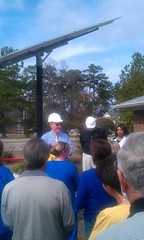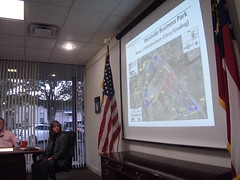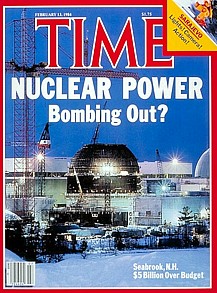
Sen. Richard Lugar (R-Ind.) and Rep. Marlin Stutzman (R-Ind.) wrote for
The Hill 5 March 2012,
REFRESH Act: Strengthen rural communities and U.S. energy security
Reauthorize and reform the popular REAP program to demonstrate
opportunities for economically viable energy investments and encourage
loans rather than grants.
 Rep. Sanford Bishop (D-Ga.) has long been working with local
farmers and USDA
Rep. Sanford Bishop (D-Ga.) has long been working with local
farmers and USDA to help with agriculture and rural jobs.
The Indiana Congress members continued:
Real commitment to rural growth requires that we put money where our
mouth — or authorization — is. We offer basic mandatory funding
that is more than paid for through cutting waste.
Renewable energy production creates jobs. Rural communities see
potential for real economic growth in the emerging biofuel sector.
Advances in technologies and agricultural techniques could offer
economic benefits from coast to coast. Using the REFRESH Act as the
basis for the next Farm Bill would help galvanize private investment
in the sector, bringing jobs to a ready economy.
Indeed it can.
 Obviously I like REAP grants, since
we got one for Okra Paradise Farms.
That 25% REAP grant plus an 35% ARRA NREL plus 35% GEFA credits
will add up to 90% covered by grants and tax credits,
which is a pretty good deal.
Obviously I like REAP grants, since
we got one for Okra Paradise Farms.
That 25% REAP grant plus an 35% ARRA NREL plus 35% GEFA credits
will add up to 90% covered by grants and tax credits,
which is a pretty good deal.
Now that remaining 10% is still a significant amount;
like the price of a small car.
But in 7-15 years (how long it will take to pay off this system,
depending on how you figure it),
what would


 the value of a car be?
Much less than when you bought it.
Meanwhile, these solar panels will be generating almost as much
power as they are now, and they will continue to generate for
at least a decade more, probably much more.
the value of a car be?
Much less than when you bought it.
Meanwhile, these solar panels will be generating almost as much
power as they are now, and they will continue to generate for
at least a decade more, probably much more.
The big missing piece is up-front financing.
Local banks will do it, but only for collateral.
By which they mean real estate.
Nope, they won’t take the solar equipment as collateral,
even though it would still be operational many years from now.
Local banks or credit unions could see this as an opportunity and start accepting solar equipment as collateral.
Beyond that, with a few changes to Georgia law,
 to deal with the power utility territoriality clause,
and maybe to
ban boondoggle charges for more dangerous and less job-producing power sources,
we could get a
commodity market in solar power in this state.
You could put up solar panels like this, or more,
on your house or business roof,
and sell your excess
power to somebody in Atlanta with less roof space.
to deal with the power utility territoriality clause,
and maybe to
ban boondoggle charges for more dangerous and less job-producing power sources,
we could get a
commodity market in solar power in this state.
You could put up solar panels like this, or more,
on your house or business roof,
and sell your excess
power to somebody in Atlanta with less roof space.
 That would produce widely distributed energy,
reducing need for foreign oil or dirty coal,
lowering your electric bills,
maybe even producing you a profit,
and generating local jobs right here in south Georgia.
That would produce widely distributed energy,
reducing need for foreign oil or dirty coal,
lowering your electric bills,
maybe even producing you a profit,
and generating local jobs right here in south Georgia.
Private investment is ready
to come in for utility-scale solar projects.
And companies like
SolarCity
that already do everything from financing to installation
could do that in Georgia.
Or home-grown companies could do that.
Or local banks could finance while local companies installed.
Anyway, we have
here on our workshop roof a proof of concept,
operational right now, purchased partly via a USDA REAP grant.
-jsq
![]() So the people of the community win!
Congratulations to
Drive Away CCA and all others who helped oppose this private prison project,
and congratulations to the Industrial Authority
for finally saying what is going on.
So the people of the community win!
Congratulations to
Drive Away CCA and all others who helped oppose this private prison project,
and congratulations to the Industrial Authority
for finally saying what is going on.


















